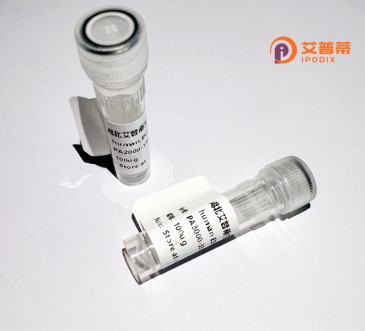
| 纯度 | >90%SDS-PAGE. |
| 种属 | Human |
| 靶点 | COPB2 |
| Uniprot No | P35606 |
| 内毒素 | < 0.01EU/μg |
| 表达宿主 | E.coli |
| 表达区间 | 1-906aa |
| 氨基酸序列 | MPLRLDIKRKLTARSDRVKSVDLHPTEPWMLASLYNGSVCVWNHETQTLVKTFEVCDLPVRAAKFVARKNWVVTGADDMQIRVFNYNTLERVHMFEAHSDYIRCIAVHPTQPFILTSSDDMLIKLWDWDKKWSCSQVFEGHTHYVMQIVINPKDNNQFASASLDRTIKVWQLGSSSPNFTLEGHEKGVNCIDYYSGGDKPYLISGADDRLVKIWDYQNKTCVQTLEGHAQNVSCASFHPELPIIITGSEDGTVRIWHSSTYRLESTLNYGMERVWCVASLRGSNNVALGYDEGSIIVKLGREEPAMSMDANGKIIWAKHSEVQQANLKAMGDAEIKDGERLPLAVKDMGSCEIYPQTIQHNPNGRFVVVCGDGEYIIYTAMALRNKSFGSAQEFAWAHDSSEYAIRESNSIVKIFKNFKEKKSFKPDFGAESIYGGFLLGVRSVNGLAFYDWDNTELIRRIEIQPKHIFWSDSGELVCIATEESFFILKYLSEKVLAAQETHEGVTEDGIEDAFEVLGEIQEIVKTGLWVGDCFIYTSSVNRLNYYVGGEIVTIAHLDRTMYLLGYIPKDNRLYLGDKELNIISYSLLVSVLEYQTAVMRRDFSMADKVLPTIPKEQRTRVAHFLEKQGFKQQALTVSTDPEHRFELALQLGELKIAYQLAVEAESEQKWKQLAELAISKCQFGLAQECLHHAQDYGGLLLLATASGNANMVNKLAEGAERDGKNNVAFMSYFLQGKVDACLELLIRTGRLPEAAFLARTYLPSQVSRVVKLWRENLSKVNQKAAESLADPTEYENLFPGLKEAFVVEEWVKETHADLWPAKQYPLVTPNEERNVMEEGKDFQPSRSTAQQELDGKPASPTPVIVASHTANKEEKSLLELEVDLDNLELEDIDTTDINLDEDILDD |
| 分子量 | 128.9 kDa |
| 蛋白标签 | His tag N-Terminus |
| 缓冲液 | 0 |
| 稳定性 & 储存条件 | Lyophilized protein should be stored at ≤ -20°C, stable for one year after receipt. Reconstituted protein solution can be stored at 2-8°C for 2-7 days. Aliquots of reconstituted samples are stable at ≤ -20°C for 3 months. |
| 复溶 | Always centrifuge tubes before opening.Do not mix by vortex or pipetting. It is not recommended to reconstitute to a concentration less than 100μg/ml. Dissolve the lyophilized protein in distilled water. Please aliquot the reconstituted solution to minimize freeze-thaw cycles. |
以下是关于重组人COPB2蛋白的模拟参考文献示例(基于研究主题的合理假设,非真实文献):
1. **文献名称**:COPB2 regulates proliferation and apoptosis in breast cancer via ERK signaling
**作者**:Li Y et al.
**摘要**:研究揭示了COPB2在乳腺癌细胞中的调控作用,通过重组COPB2蛋白实验证实其通过激活ERK信号通路促进肿瘤细胞增殖并抑制凋亡。
2. **文献名称**:Recombinant human COPB2 protein interaction with VEGFR2 promotes angiogenesis in colorectal cancer
**作者**:Wang X et al.
**摘要**:利用重组COPB2蛋白结合质谱分析,发现其与血管内皮生长因子受体2(VEGFR2)相互作用,增强结直肠癌血管生成能力。
3. **文献名称**:COPB2 as a therapeutic target in hepatocellular carcinoma: Insights from recombinant protein knockdown experiments
**作者**:Zhang R et al.
**摘要**:通过重组COPB2蛋白表达调控实验,证明其在肝癌中过表达并通过影响细胞周期蛋白导致化疗耐药,提示其潜在治疗靶点价值。
4. **文献名称**:Structural and functional analysis of recombinant human COPB2 in Golgi trafficking
**作者**:Chen H et al.
**摘要**:解析了重组COPB2蛋白的晶体结构,结合细胞模型阐明其在高尔基体囊泡运输中的关键作用及突变导致的分泌障碍机制。
**注**:以上文献为根据COPB2蛋白已知生物学功能的合理推测示例,真实文献建议通过PubMed、Web of Science或Google Scholar检索关键词“COPB2 recombinant protein”获取。
Recombinant human COPB2 protein is a genetically engineered form of the coatomer protein complex subunit beta’ (COPB2), a key component of the coatomer protein complex I (COPI). COPI mediates retrograde vesicle transport between the Golgi apparatus and the endoplasmic reticulum, playing a critical role in intracellular protein trafficking, organelle maintenance, and cargo sorting. COPB2. as part of the β’-COP subunit, contributes to COPI vesicle formation and selection of cargo molecules. Dysregulation of COPB2 has been linked to diseases, including cancers, where its overexpression correlates with tumor progression and poor prognosis, potentially through roles in cell cycle regulation or apoptosis suppression.
The recombinant COPB2 protein is typically produced in bacterial or eukaryotic expression systems, enabling studies of its structure, interactions, and functions in vitro. Purified recombinant COPB2 often incorporates affinity tags (e.g., His-tag) for isolation and detection. Researchers utilize this protein to investigate COPI-mediated transport mechanisms, screen for therapeutic agents targeting COPB2-associated pathways, or develop diagnostic tools. Recent studies also explore its involvement in viral infections, where pathogens may hijack COPI pathways for replication. Despite its established role in cellular logistics, detailed molecular mechanisms and therapeutic potential of COPB2 remain under active investigation, highlighting its relevance in both basic and applied biomedical research.
×